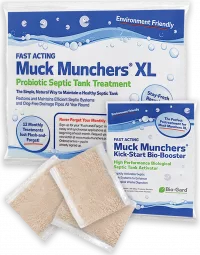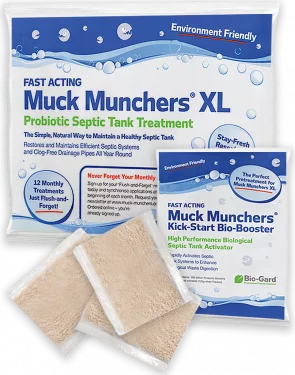6 Septic Tank Myth Busters Septic Tank Owners Should Know!
Septic tank myths – are there such things? Well, after our team at Muck Munchers started to do a little research, we found quite a lot of conflicting information. We were a little surprised at some of the answers we found online to some commonly asked questions about septic tank treatments and maintenance.
If you own a septic tank, or you are researching septic tanks prior to purchasing a house that isn’t connected to the mains supply, you’ll benefit from reading the top septic tank myths our team has uncovered. It really is easy to have a healthy, odour-free septic tank that doesn’t cost the earth! Read on as we uncover six septic tank myths.

6 Septic Tank Myths
Septic Myth 1 – You Need to Empty Your Septic Tank Every Year
This is possibly the biggest septic tank myth, and hence makes number 1 in our list; it’s simply untrue. You definitely do not need to empty your septic tank every year as “simply as a matter of routine” The answer to this question varies widely when you start searching online – anything from 1 – 5 years. Of course, for some Muck Munchers customers, the period can be even longer.
You can understand why some septic tanks need emptying more frequently, especially if they are poorly maintained or that the size of the tank is too small for the number of occupants in a property. Indeed, some septic tanks may even be shared with new properties adding to the load.
Septic Myth 2 – The Tank’s Always Full and Needs Emptying Again
This septic tank myth may well come as a surprise – your septic tank should always full! The fact is that septic tanks are designed to fill up to the outlet pipe near the top and then overflow into either a subsequent tank or into the soakaway.
How Do You Know When Your Septic Tank Needs Emptying?
A septic tank needs to be emptied when excessive sludge develops in the bottom of the unit. If the tank is in good health with a highly active bacterial population, then waste digestion will be more effective, and sludge will build-up more slowly.
The best approach is to check your tank periodically, say every 6 months and keep an eye on sludge build-up. You’ll find more details about measuring sludge levels in our Septic Sludge Blog.
There are other tell-tale signs that your tank needs emptying and that, in addition, you may have a blocked soakaway system too:
- You notice issues when flushing your toilet, and possibly your washing machine may start to drain slowly or overflow.
- You can see water sitting on the ground surrounding your septic tank drainfield area.
- Your septic tank overflows.
Septic Myth 3 – I Need to Empty My Tank Again Because It Smells
Again, another septic tank myth that simply isn’t true. Septic tanks will smell if there is a problem with waste digestion and that waste is not being properly digested. Quite simply, if the tank is overloaded and stagnant, you need to carefully think about what you are discharging into your septic system and perhaps change you habits. If a tank smells, the reason is that the system is depleted of oxygen, resulting in anaerobic digestion that produces hydrogen sulphide and other obnoxious gases.
The Two-Step Golden Rule to Prevent Bad Smells from Your Septic Tank
- First, try to only flush the 3 P’s into your tank – that’s Pee, Poo and Paper
- Repopulate your septic tank system with a biological speitc tank treatment, such as Muck Munchers XL, to increase and maintain optimum aerobic wast digestion
Septic Myth 4 – Adding Septic Tank Bacteria is a Waste of Time!
Wow! This septic tank myth is an interesting one. The fact is all septic tanks and package sewage treatment plants need bacteria to break down organic waste. Discharging hazardous chemical cleaners, household contaminants, medications and excessive fats, oils and greases destroy both the balance and the bacteria themselves.
In modern households it can be difficult to maintain strict control over unwanted discharges, which is why adding additional probiotic bacteria to your septic system helps to maintain a healthy aerobic bacterial population to ensure high levels of organic waste digestion. That, in turn, will eliminate foul smells, unnecessary pump-outs and maintain a healthier, more free-drianing soakaway and drainfield.
Septic Myth 5 – You Can Flush Just About Anything into Your Septic Tank
No. You really must not flush anything and everything into your septic tank or sewage treatment plant – they are not bottomless pits. Doing so can result in increased pump-outs and damage to pumps and filters.
Soakaways and drainfields are an integral part of the septic system. Discharging contaminants and inorganic materials can result in blockages in the underground drainfield pipes too that, at best are difficult to remove and at worst, may result in the need to completely rebuild drainfields, which can prove extremely costly.
For a comprehensive list of discharges to avoid visit the FAQ’s Section at Your Septic System – What Not to Flush Into It!
Septic Myth 6 – A Septic Tank Only Lasts for 20 Years!
This really is a loaded septic tank myth with many factors at play. Your septic system can last anywhere between 15 – 40 years, according to many septic tank and treatment plant manufacturers and installers. That said, at Muck Munchers, we have literally thousands of customers with Victorian tanks, over 100 years old.
One of the biggest culprits contributing to a short lifespan is hydrogen sulphide, a gas produced by anaerobic bacterial digestion. Apart from being the cause of obnoxious smells, mixed with water it becomes sulphuric acid that attached concrete, cement and steel components. It is yet another reason to maintain a healthy aerobic septic system with an easy-to-use aerobic digestion additive, such as Muck Munchers.











